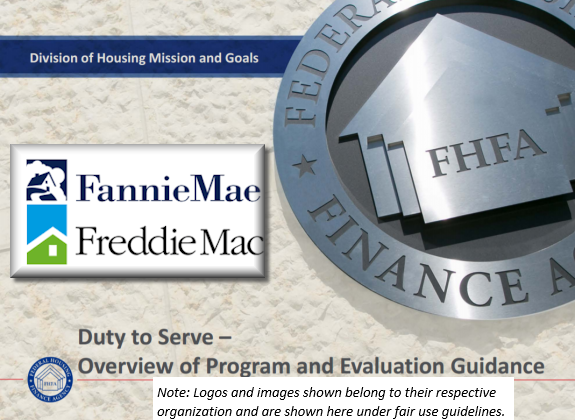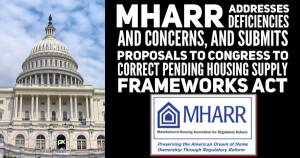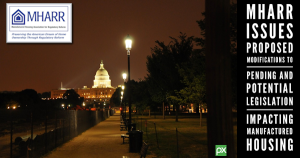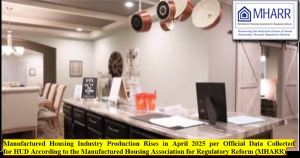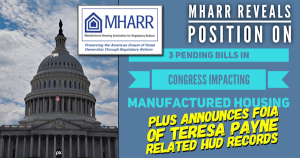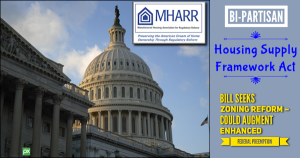[vc_row][vc_column][vc_column_text]Washington, D.C., May 9, 2017 – The entirely discretionary final “Duty to Serve Underserved Markets” (DTS) rule published by the Federal Housing Finance Agency (FHFA) on December 29, 2016 — opposed by the Manufactured Housing Association for Regulatory Reform (MHARR) as being totally inconsistent with the mandatory and remedial nature of DTS as enacted by Congress — has now yielded entirely predictable results; proposed three-year DTS “implementation” plans by both Fannie Mae and Freddie Mac (published by FHFA on May 8, 2017) which fail to make any commitment whatsoever to market-significant ongoing purchases of the chattel (personal property) loans which comprise the vast majority (80%) of the manufactured housing consumer financing market.
In attempting to effectively nullify Congress’ DTS directive to both Enterprises to finally serve the manufactured housing market after refusing — for decades — to provide any securitization or secondary market support for chattel loans and only negligible support for manufactured home real estate loans, the Fannie Mae and Freddie Mac proposed DTS implementation plans would leave in place, for the foreseeable future (and, potentially, forever), longstanding policies that harshly discriminate against the lower and moderate-income Americans who rely on affordable manufactured housing — unnecessarily forcing those same consumers into higher-cost loans offered by the handful of current industry-dominant lenders, or excluding them altogether from the manufactured housing market and the American Dream of home ownership.
Commenting on the FHFA final rule soon after its publication, MHARR stated: “If Congress had meant the “duty to serve” to be optional, it would not have called it a “duty.” The dictionary definition of a “duty” has – at its core – a mandatory responsibility. And Congress is presumed to use words according to their ordinary and customary meaning. But nothing in the FHFA rule would require Fannie Mae or Freddie Mac to do anything to support MH chattel loans – not even a “pilot program….” So the “duty” instituted by FHFA is not really a “duty” at all, but more of a choice left to entities that have steadfastly refused to provide secondary market support for MH chattel loans – which prompted the “duty to serve” in the first place.”
Not surprisingly, given the discretionary, non-mandatory nature of the DTS “implementation” rule adopted by FHFA, which offered multiple paths to avoid any type of securitization or secondary market support for manufactured housing chattel loans, and the Enterprises’ habitual, deep-seated antipathy toward manufactured housing loans and manufactured home buyers, neither Fannie Mae nor Freddie Mac, in their implementation plans, propose even a modest program of on-going, market significant manufactured home chattel loan support. Instead, nearly a decade after the enactment of the DTS mandate as part of the Housing and Economic Reform Act of 2008 (HERA) – to provide timely and material relief for historically underserved consumers in the manufactured housing market — the proposed plans offered by Fannie Mae and Freddie Mac are a study in obfuscation and needless delay which make a mockery of the original letter and intent of DTS as enacted by Congress.
After having had the opportunity – for nearly ten years after the enactment of DTS – to seek, obtain and analyze chattel-relevant information; having published and received extensive public comment on two proposed DTS implementation rules – in 2010 and 2015; after meetings with industry and other stakeholders at FHFA in 2016; after three DTS “listening sessions” in 2017; after an April 26, 2017 meeting with industry stakeholders at FHFA; after receiving public comments in response to FHFA’s January 2017 “Request for Input” (RFI) specifically addressing manufactured home chattel lending; after many other undocumented meetings with stakeholders, visits to industry gatherings, forums and trade shows; and knowing that current “portfolio” manufactured housing lenders have developed a profitable business model (with higher-cost interest rates that would produce even greater returns with the lower rates and significantly greater volume that would result from Enterprise support), both Fannie Mae and Freddie Mac still claim, in their respective proposed plans, that they need to acquire and study additional “information” regarding chattel loans before they can establish any type of even severely-limited support for manufactured home chattel loans. This ten-year charade, now coming to an end, will unfortunately conclude to the ultimate detriment of consumers, unless significant changes are made to the proposed plans.
Freddie Mac, for example, states in its proposed plan: “We expect that we will have garnered sufficient information by year two to develop guidelines for a chattel pilot. *** We intend to continue our research and outreach in year three….” The plan then indicates that Freddie Mac will “initiate a pilot for chattel,” potentially in the third and final year of its plan – “subject to receipt of FHFA approval,” but offers no volume parameters for such a program. Likely foreshadowing a severely limited pilot program, even at that point, Freddie Mac states: “The success of a pilot program – even if it does not result in a significant number of loans purchased – will be in the form of lessons learned.” (Emphasis added).
Fannie Mae similarly falls back on the alleged need to “acquire industry chattel data and information essential to the development of a chattel pilot.” Unlike Freddie Mac, though, it does propose to “pursue internal” and FHFA “approval” to purchase chattel loans under a pilot program during year-one of its plan. However, even assuming that such approvals are actually sought – and actually obtained – the pilot program envisioned by Fannie Mae would entail purchases of “between 350 and 425 chattel loans per year….” To place these numbers in perspective, such purchases would amount to providing support for 0.43% to 0.52% of the 81,136 HUD Code manufactured homes produced during 2016. For the approximately 80% of new manufactured homes produced in 2016 placed as chattel (i.e., 64,909 homes), the comparable figures would be 0.53% to 0.65%. Even these miniscule percentages, though, would fall with somewhat higher production levels anticipated in 2017 and subsequent years.
The proposed plans, accordingly, do not even come close to satisfying the mandate of DTS. As MHARR stated at the February 8, 2017 FHFA-DTS “listening session:” “[A] limited manufactured housing chattel loan ‘pilot program’ of the type authorized by the DTS final rule and Evaluation Guidance … would be a prescription for ultimate failure because: (1) it would inevitably be too small, too limited, too restrictive (and too late) to serve a meaningful segment of the consumers that DTS was designed and intended to benefit; and (2) it would inevitably be too small, too limited, too restrictive (and too late) to properly measure or gauge success in a market comprised of millions of Americans.” This stands in sharp contrast with MHARR’s call “for a series of Enterprise-securitized chattel loans in volume, staggered over multi-year periods, so that they can be analyzed and evaluated every three years for any adjustment as warranted for the next series … [that] would make affordable homeownership immediately available to millions of Americans.”
Indeed, many will be left to wonder whether the FHFA final rule and these wholly deficient plans are actually designed to maintain the unacceptable status quo – a highly-distorted and less than fully-competitive manufactured housing consumer finance market dominated, in part, by the finance arm of the industry’s largest manufacturer, where consumers pay higher-cost interest rates because of the absence of securitization and secondary market support for those loans and the enhanced competition that such support would produce.
In Washington, D.C., MHARR President and CEO Mark Weiss stated: “With nearly ten years already gone, how much longer will consumers have to wait for financing parity with other types of housing? Given a ‘duty’ by Congress, the burden is not – and should not – be on the industry and consumers to prove their worthiness. The burden should be on FHFA and the Enterprises to show why they are not complying with the will and word of Congress now. With public comments on the proposed plans due on or before July 10, 2017, industry members and consumers will have one more chance to let FHFA know – through such comments — that the Fannie and Freddie plans are wholly-deficient, and to seek the correction and reform of those now-useless plans.”[/vc_column_text][/vc_column][/vc_row]

